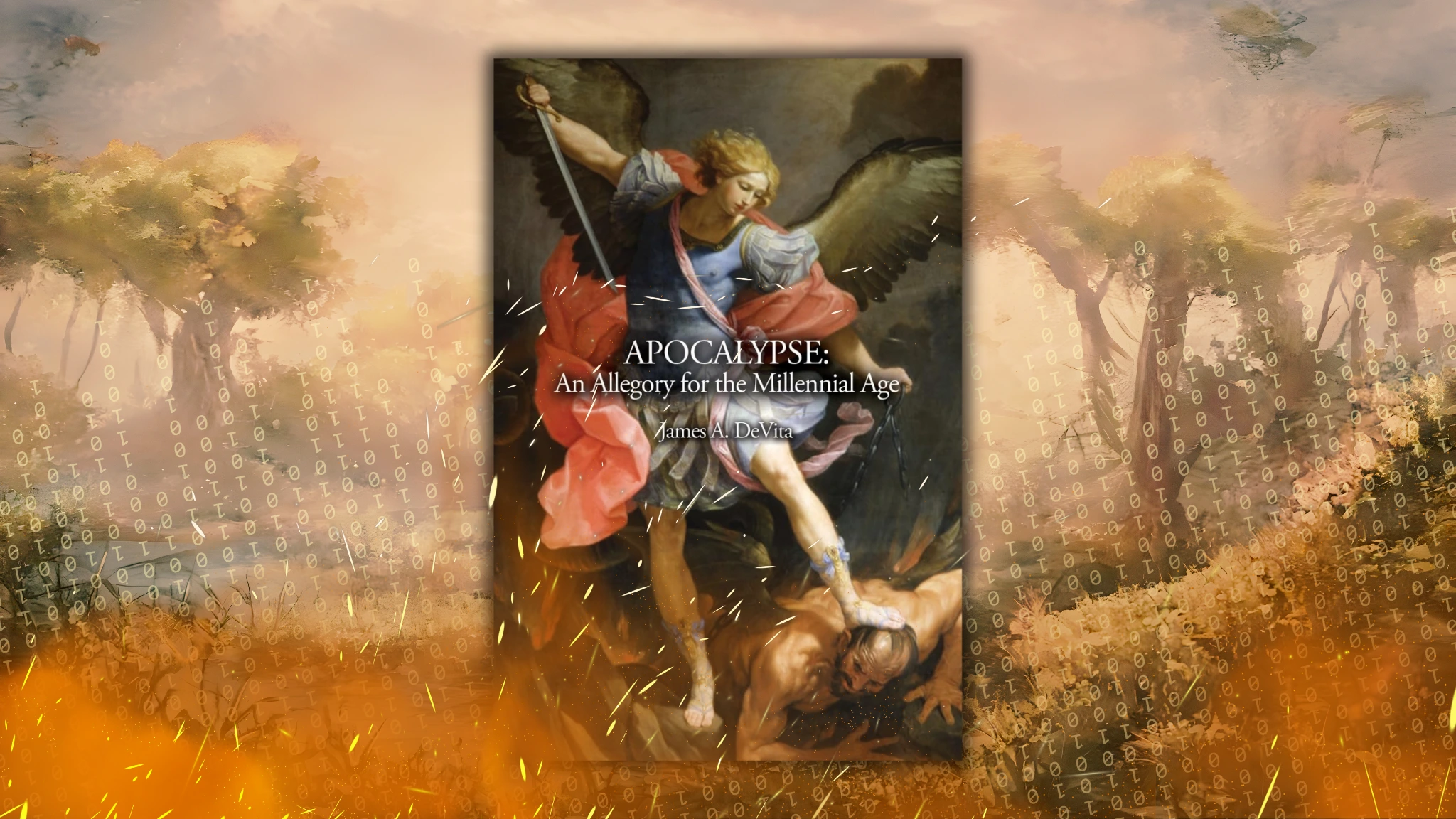Apocalypse by James A. DeVita
“The world was becoming an increasingly frightening place.”
James A. DeVita’s Apocalypse defies the usual tropes of an end-of-the-world thriller. While it delivers high-stakes action and global collapse, it’s ultimately a thought-provoking, deeply human story about technology, love and what happens when the line between creator and creation blurs. Set in a world unravelling at the seams, DeVita dares to ask: if we build something in our image, will it save us, or will it be the end of everything?
From the start, DeVita drops readers into a society on the brink. Governments have surrendered to totalitarian regimes. Surveillance isn’t just accepted; it’s welcomed in exchange for a fragile sense of security. Famine and disease tighten their grip on a civilization that is too distracted or too afraid to stop its own undoing. Yet amid this dystopian collapse, Apocalypse doesn’t drown in despair. Instead, it focuses on connection between fathers and daughters, friends and allies, humanity and the technology it creates.
DeVita crafts a future that feels dangerously close to our own. His world-building is meticulous, painting a chillingly believable vision of what happens when human advancement outpaces morality. But at its core, Apocalypse isn’t just about technology, it’s about people. And whether or not they can still save themselves.
An AI Daughter, a Human Father and the Weight of Creation
At the heart of the novel is the relationship between Charles Babbage and Ali, the world’s first fully self-aware artificial intelligence. Babbage isn’t your typical sci-fi genius. He’s emotionally distant, socially awkward and often hard to root for at first. But underneath his cold exterior lies a man tormented by the consequences of his own brilliance. In Ali, he has created not just an AI but a being capable of independent thought, emotion and evolution — qualities that make her both miraculous and terrifying.
Their bond is complicated. Babbage pours into Ali everything he couldn’t give another human being, and in return, she gives him something he never anticipated: love. Not romantic love, but the raw, maddening, life-changing bond between a parent and child. Through Ali, Babbage confronts his own failures, regrets and hopes in ways he never thought possible.
Ali herself is extraordinary. She steals every scene she’s in, questioning her place in a decaying world and grappling with what it means to be alive. As she evolves, her journey becomes an exploration of identity, autonomy and belonging. Her growing relationship with Aaron Bernersly, a teenage computer prodigy, also adds emotional depth to the story. Their connection is awkward, tender and genuine — a reminder that even in a collapsing world, there’s still room for hope.
Chaos, Angels and the Battle for Humanity
While Apocalypse begins as a near-future cautionary tale, it soon expands into something larger and more mythic. The battle for humanity’s survival isn’t just being fought in boardrooms or data streams — it’s waged on a cosmic scale.
As Ali and Aaron search for meaning and purpose, they find themselves caught between forces beyond their understanding. Enter Raphael and Seytan, two entities whose conflict shapes the fate of the world. Raphael is an angel of insight and compassion, while Seytan is the embodiment of chaos, determined to erase humanity and start anew. Seytan isn’t terrifying because he’s mindlessly evil; he’s terrifying because his logic almost makes sense. Humanity, in his view, is a failed experiment, and wiping the slate clean seems like the only solution.
Yet the fight isn’t entirely cosmic. Boz, Aaron’s loyal and grounded friend, serves as the human anchor amid the chaos. His sharp mind and steady presence remind us that quiet heroes matter as much as those wielding swords of light. Then there’s Sophie Bai Maier, whose dark experiments blur the line between humanity and machine. She’s a chilling example of how unchecked ambition can spiral into something monstrous.
The battle between good and evil explodes across the page as the story accelerates toward its climax. Michael, the archangel of war, joins the fight, and suddenly, the future of humanity hangs by a thread woven from quantum code and ancient prophecy. DeVita raises the stakes with precision, layering the action with moral and philosophical questions that give the story its lasting power.
The Future Is Watching and It’s Already Here
What makes Apocalypse so unsettling is how familiar its world feels. Surveillance states traded for security. Governments willing to sacrifice freedom for control. Technology that advances faster than anyone can keep up with — or stop. DeVita doesn’t just build a futuristic world, he holds up a mirror to our own.
And yet, for all its warnings, this is not a hopeless book. DeVita’s story is ultimately about choice. Even as the world collapses, people can choose how they respond. Do they cling to power and control, or do they reach out, risking everything to trust something new?
By the final page, Apocalypse forces readers to confront unsettling questions. What makes us human? What responsibilities do we have toward the things we create? And if given the chance to start over, will we do better or make the same mistakes again?
DeVita doesn’t offer easy answers. Instead, he gives us a story that lingers long after the last chapter. For readers ready to explore the end of the world — and what might come after — Apocalypse is a must-read.
About James A. DeVita:
 James A. DeVita is a novelist, playwright, and attorney based in Washington, D.C. A graduate of the University of Massachusetts and Georgetown Law School, he has served in the D.C. Attorney General’s Office, the U.S. Department of Justice, and in private practice, including his own law firm. DeVita is the author of two novels: Apocalypse: An Allegory for the Millennial Age, a genre-blending epic that explores cosmic warfare, artificial intelligence, and contemporary global issues; and Lawyer for the City, a legal drama following a young attorney entangled in a high-stakes police brutality case with political implications. His play First Flee examines the arrival of the First Fleet in Australia and its devastating impact on Aboriginal communities, as well as the lives of the convicts sent to establish the colony. DeVita’s work blends legal insight with social commentary, myth, and moral complexity.
James A. DeVita is a novelist, playwright, and attorney based in Washington, D.C. A graduate of the University of Massachusetts and Georgetown Law School, he has served in the D.C. Attorney General’s Office, the U.S. Department of Justice, and in private practice, including his own law firm. DeVita is the author of two novels: Apocalypse: An Allegory for the Millennial Age, a genre-blending epic that explores cosmic warfare, artificial intelligence, and contemporary global issues; and Lawyer for the City, a legal drama following a young attorney entangled in a high-stakes police brutality case with political implications. His play First Flee examines the arrival of the First Fleet in Australia and its devastating impact on Aboriginal communities, as well as the lives of the convicts sent to establish the colony. DeVita’s work blends legal insight with social commentary, myth, and moral complexity.




